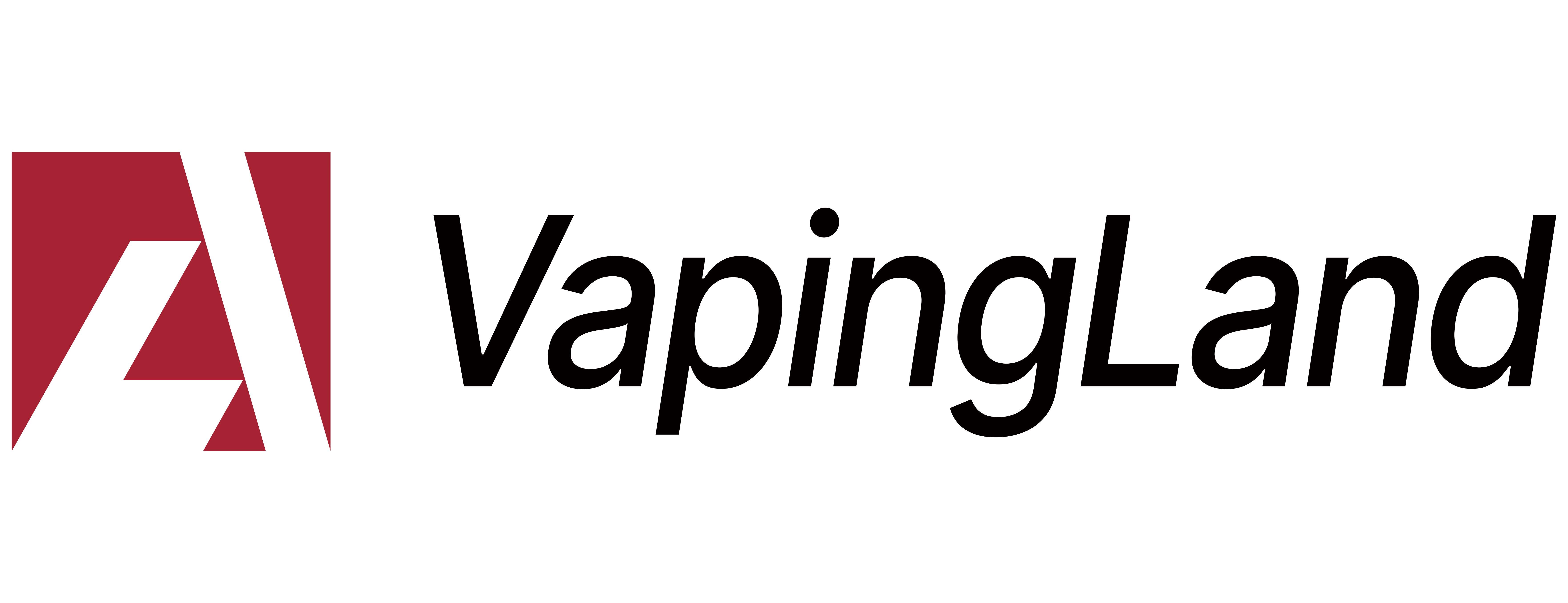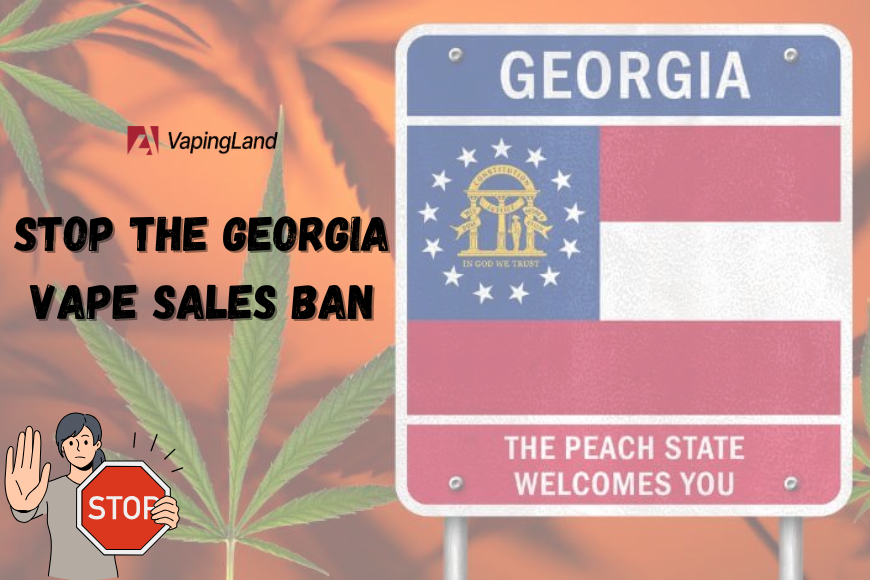In an unprecedented move that is poised to reshape the nicotine consumption market and redefine public health policy in the state, Georgia’s legislative bodies have proposed a series of bills, which will now proceed to the House for a hearing. Included in the bills are a proposal to place a ban on certain flavored vapes and some modifications to THC’s laws.
Flavored Vape Bans Across the U.S. (Latest Updated 2025/4/8)
While Georgia considers joining the movement, it’s worth noting that six U.S. states have already banned flavored vaping products: California, Massachusetts, New Jersey, New York, Rhode Island, and Utah. Additionally, Washington, D.C., and several major cities—including Chicago, Denver, and Columbus, Ohio—have enacted similar flavor bans. Some of these restrictions also apply to nicotine pouches, further tightening the scope of accessible flavored nicotine options.
These growing restrictions across the nation reflect an ongoing trend toward limiting flavored nicotine products, often justified by concerns over youth usage. However, the impact on adult consumers and small businesses continues to fuel debate.
Is Georgia Banning Flavored Vapes?
The state of Georgia is on the verge of banning flavored vapes if its recent state bills are passed into law.
If you believe vape shops ought to be permitted to sell flavored products, we'd love to hear from you. Drop a comment below and share your thoughts on what actions we can take to support this, like reaching out to local lawmakers or launching awareness - campaigns.
Read More: Banning Flavored Vapes = No More Teen Vaping?

Over the past decade, vaping has evolved from a niche alternative to combustible cigarettes into a mainstream consumer product. Initially celebrated for its potential to serve as a harm-reduction tool for adult smokers, vaping experienced rapid growth amid a backdrop of public health debates. However, concerns regarding youth vaping and the proliferation of unregulated products prompted state and federal agencies to revisit existing regulatory frameworks.
In recent years, particularly in 2024, Georgia lawmakers introduced punitive measures aimed at curbing the availability of vape products, citing concerns over underage usage and public health risks. These early initiatives set the stage for the sweeping changes being proposed recently,
What are the New Georgia State Bills?
First off, a critical catalyst for these bills has been the evolving stance of the Food and Drug Administration (FDA) regarding nicotine vaping products nationwide. The FDA’s Premarket Tobacco Application (PMTA) process has been a contentious issue, with many independent brands struggling to secure the necessary approvals amid complex regulatory requirements.
The 2025 regulations effectively mandate that only products approved under the PMTA process can be legally sold, positioning the state as an enforcement arm of federal guidelines. This alignment with FDA directives is designed to serve as both a protective measure and a catalyst for market consolidation.

In theory, the regulations are intended to safeguard public health by ensuring that all vapor products meet strict safety and quality standards. In practice, however, critics argue that this will lead to a monopolistic market dominated by large tobacco corporations, leaving independent vape shops on the outskirts of an increasingly restricted industry.
HB 577: Enforcing FDA Directives
HB 577, often referred to in industry circles as the “Georgians Foot the Bill for Enforcing FDA Directives” measure, aims to integrate FDA regulations into state law. The bill mandates that all vape products available for sale must have received PMTA approval from the FDA. Advocates argue that this move will standardize product quality and ensure consumer safety; critics claim it disproportionately benefits large corporations while sidelining innovative, independent brands.
HB 605: Restrictive Measures Under the Guise of Public Health
HB 605 is positioned as a bill to support the Georgia Quit Line. Ostensibly, it is intended to promote cessation among smokers by limiting the accessibility of vaping products. However, industry insiders contend that HB 605 essentially conflates vaping with traditional smoking, imposing unnecessary restrictions that could deter adult smokers from switching to potentially safer alternatives. By equating vaping with combustible cigarettes, this measure not only undermines harm reduction strategies but also reinforces outdated public health paradigms.

HB 84: A Tax Increase with Broad Economic Ramifications
HB 84 proposes a significant increase in the tax rate on consumable vapor products—from 7% to 15% of the wholesale cost. While lawmakers claim that the additional revenue will fund critical healthcare initiatives, industry experts warn that the tax hike is likely to drive adult consumers back to traditional cigarettes, which are subject to lower taxation. The economic impact of HB 84 is profound, as it threatens to erode the market share of independent vape shops and shift consumer behavior in unpredictable ways.
HB 1260: The PMTA Registry Law
Also known as the “Georgia PMTA Registry Law,” HB 1260 is one of the most controversial elements of the new regulatory framework. This law stipulates that all vape products released after 2016 must be registered and receive PMTA approval from the FDA. In practical terms, this means that a vast array of popular disposable and refillable vape products will be rendered illegal unless they can meet the stringent requirements of the federal approval process. The law is projected to have a disruptive effect on the industry, forcing many small businesses to either adapt or shutter their operations.
Legislative Rationale and Objectives
From a legislative perspective, the driving objectives behind the Georgia bills are threefold:

Consumer Protection: Lawmakers emphasize the need to protect consumers from potentially harmful products that have not been rigorously tested. By enforcing FDA standards, the state aims to eliminate unsafe products from the market.
Public Health Improvement: With youth vaping rates reportedly at a 10-year low, critics argue that the ban is an overreach that penalizes adult consumers who have successfully switched from combustible cigarettes to vaping—a strategy widely recognized as a harm reduction measure. Nonetheless, the public health narrative remains a powerful justification for stringent regulations.
Market Consolidation: The new laws appear to favor established, large-scale manufacturers who possess the resources to navigate the complex PMTA process. This market consolidation is expected to create a regulatory environment where only a handful of products, predominantly from Big Tobacco, can legally be sold, thereby increasing their market dominance.
Industry Reaction and Economic Impact
Many independent retailers are already facing increased compliance costs and operational challenges due to the stringent regulatory requirements. The need to secure FDA PMTA approvals, coupled with higher tax rates, has put a considerable strain on smaller businesses with limited capital. These new regulations would further stiffen things up, and potentially drive a significant number of these independent players out of the market, paving the way for a monopolistic landscape dominated by large, well-capitalized corporations.

The economic impact of the vaping ban is multifaceted. On one hand, the increased tax revenue from HB 84 is expected to bolster state healthcare budgets, funding vital public health initiatives. Proponents of the tax increase argue that the additional revenue will offset the long-term healthcare costs associated with smoking-related illnesses. However, the short-term consequences for the vaping industry could be severe.
For instance, the cost differential between products from independent manufacturers and those from Big Tobacco is substantial. A leading independent vape product, such as a disposable vape from Lost Mary or Geek Bar, typically costs a fraction of what a Big Tobacco-manufactured product like Vuse Alto or Juul might cost. With the imposition of a 15% tax on all vapor products, consumer prices are expected to rise dramatically. This price increase could push many adult vapers back to combustible cigarettes—a trend that public health officials have long sought to reverse.
Legal and Regulatory Analysis: The FDA’s Role and the PMTA Process
Central to the Georgia new bills is the FDA’s Premarket Tobacco Application (PMTA) process. This process requires manufacturers to provide extensive scientific data demonstrating that their products are “appropriate for the protection of public health.” While the intent is to ensure product safety, the process has been widely criticized for its complexity and the disproportionate burden it places on small businesses.
By mandating PMTA approvals as a precondition for legal sale, the state of Georgia is effectively outsourcing its regulatory enforcement to federal standards. While this alignment aims to create a consistent and scientifically validated framework, it also opens the door for legal challenges, with concerns that the ban could be subject to litigation on constitutional grounds, particularly with respect to property rights and market interference.
Georgia THC Bills 2025
On another hand, Georgia lawmakers are looking to significantly overhaul hemp and cannabis regulation with a series of bills aimed at imposing strict limits on delta-9 THC in consumable hemp products. Key proposals, such as Senate Bill 254, seek to establish milligram limits for THC—particularly targeting high-potency consumables like beverages—citing public safety concerns by comparing these products to “loaded guns in a can.”

The primary objectives are to protect consumers (especially minors) from the risks of overconsumption while ensuring robust testing and clear labeling of hemp products. These legislative measures are designed to balance rigorous public health standards with the economic realities of a burgeoning industry. Small businesses, which have already experienced revenue losses due to previous restrictions, fear further market consolidation as compliance costs rise.
In parallel, complementary bills aim to regulate other THC-infused products such as edibles and tinctures by setting precise dosage limits, thereby promoting a more transparent and enforceable regulatory framework.
Verdict
It may interest you to know that an FDA-funded study shows that cigarette sales increase in areas with flavor bans. So, the more places where flavored vapes get banned, the more traditional cigarette sales in the region; this prompts the question, “Are these regulations really for the public health?” Apparently, cigs are more dangerous than flavored vapes, so why ban flavored vapes and leave cigs?
Keep Reading:
Vapers, Pay Attention! This Lawsuit Could Affect Your Vape Supply!
Bans Aren’t Working? How Vape Brands Are Outsmarting FDA Rules!


















































3 comments
I quit smoking cigarettes by using a vape, and it’s been about a year since. I feel so much better. I go jogging and I workout, and I never could’ve done it smoking cigarettes. I’ve tried so many ways to quit, but vaping is the only thing that worked. I’m 44 years old, I’m grown. I feel like as an adult I should be able to vape if want to. I agree we should keep them out of kids hands… absolutely. But all I see are adults like me, using them to stop smoking. So go ahead take something else from us, you always do.
This state continues to ruin lives!! How do you ban something that is less harmful than what y’all support, like alcohol and cigarettes?? Over money? Because that’s what this whole thing is giving. All you want is more reason to make people poor and to put people in jail with unrealistic fines and punishment. This state defines corruption and abuse of power.
We are distrought over the possible passing if this bill. In 2019 my husband and I quit smoking cigarettes and switched to vaping, which lead us to open 2 vape stores. We have employed many people throughout the years and we take care of our own family and raise our 4 kids on this income. We have helped thousands of smokers switch to vaping, and we congratulate them when they are ready to quit all together! I would hate to see this bill pass all due to big tobacco and the greed of the corporations. Please do what you can to stop this bill. Our livelihood depends on it